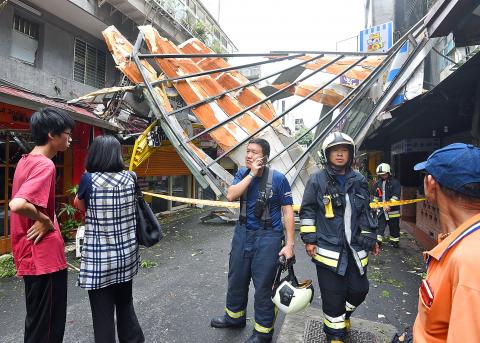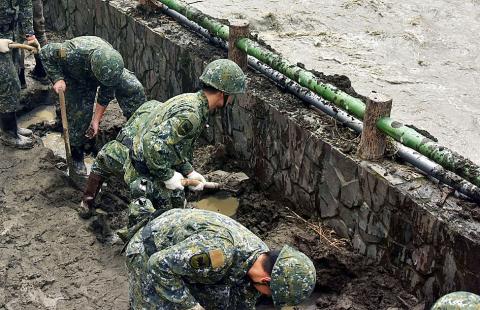More than 600 people were injured by Typhoon Megi, which made landfall on the east coast on Tuesday afternoon.
The Central Weather Bureau (CWB) lifted both land and sea warnings at 5:30pm yesterday after Megi weakened into a tropical storm and landed on China’s Fujian Province.
CWB forecaster Hsieh Ming-chang (謝明昌) said that although the nation was no longer under the storm’s coverage, wind speed in coastal areas still reached level 8 on the Beaufort scale.

Photo: Liao Chen-huei, Taipei Times
Heavy precipitation continued in some southern regions due to lingering clouds from the storm, which should ease today, he said.
He added that a low-pressure system that is about 500km southeast of Taiwan is likely to move toward the nation between tomorrow and Saturday, which could affect the weather in Hualien, Taitung and southern Taiwan, he said.
Meanwhile, Tropical Storm Chaba formed early yesterday morning, which the bureau forecast would move near Okinawa, Japan, by Monday.

Photo: CNA
Hsieh said the storm was still about 2,860km from Taiwan.
“We are monitoring the movement of Chaba and the force of the Pacific high-pressure system, which would determine when the storm would turn north and in which direction it would go,” he said.
Statistics from the Central Emergency Operation Center as of 5:30pm yesterday showed that Megi left four people dead and 622 injured in the past two days, with more than 4,000 people remaining in shelters.
A total of 2,402 households were still without water supply.
Telecom service providers said they had mobilized thousands of engineers to repair about 13,000 base stations that were damaged. A total of 5,384 base stations had not resumed normal functions.
As of 9:53pm yesterday, 359,927 households were still without power, state-run Taiwan Power Co (台電) said.
The Taiwan Railways Administration (TRA) and Taiwan High Speed Rail Corp resumed train services yesterday afternoon, although TRA canceled operations of the Alishan Forest Railway, as well as the Pingsi (平溪) and Jiji (集集) branch lines.
More than 750 flights departed from the Taiwan Taoyuan International Airport yesterday, as the nation’s largest airport activated a plan to transport about 12,000 passengers whose flights were canceled on Tuesday.
Statistics from the Civil Aeronautics Administration (CAA) showed that 234 domestic flights and 58 international flights were canceled yesterday.
One domestic and 112 international flights were also delayed.
The agency said that it was investigating whether EVA Air (長榮航空) had violated aviation rules when it dispatched flights on Tuesday. Netizens have accused the nation’s second-largest airline of forcing pilots to land under inclement weather.
The standards that the airline company set to dispatch or land a flight on a typhoon day, as well as the amount of fuel that its airplanes were carrying and the number of hours its cabin crew were working would all be under scrutiny, the CAA said.
EVA had 45 flights that were scheduled to land at the Taoyuan Airport on Tuesday. Thirty flights landed at the airport, including those returning to Taoyuan after first landing in Hong Kong or Okinawa. In addition, seven flights landed in Hong Kong, seven in Taichung and one in Macau, the agency said.
The CAA said the airline is supposed to choose at least two backup airports if its flights could not land at their target destinations.
EVA yesterday issued a statement denying the allegations, adding that it would sue individuals spreading unsubstantiated comments online.

The US government has signed defense cooperation agreements with Japan and the Philippines to boost the deterrence capabilities of countries in the first island chain, a report by the National Security Bureau (NSB) showed. The main countries on the first island chain include the two nations and Taiwan. The bureau is to present the report at a meeting of the legislature’s Foreign Affairs and National Defense Committee tomorrow. The US military has deployed Typhon missile systems to Japan’s Yamaguchi Prefecture and Zambales province in the Philippines during their joint military exercises. It has also installed NMESIS anti-ship systems in Japan’s Okinawa

‘WIN-WIN’: The Philippines, and central and eastern European countries are important potential drone cooperation partners, Minister of Foreign Affairs Lin Chia-lung said Minister of Foreign Affairs Lin Chia-lung (林佳龍) in an interview published yesterday confirmed that there are joint ventures between Taiwan and Poland in the drone industry. Lin made the remark in an exclusive interview with the Chinese-language Liberty Times (the Taipei Times’ sister paper). The government-backed Taiwan Excellence Drone International Business Opportunities Alliance and the Polish Chamber of Unmanned Systems on Wednesday last week signed a memorandum of understanding in Poland to develop a “non-China” supply chain for drones and work together on key technologies. Asked if Taiwan prioritized Poland among central and eastern European countries in drone collaboration, Lin

ON ALERT: Taiwan’s partners would issue warnings if China attempted to use Interpol to target Taiwanese, and the global body has mechanisms to prevent it, an official said China has stationed two to four people specializing in Taiwan affairs at its embassies in several democratic countries to monitor and harass Taiwanese, actions that the host nations would not tolerate, National Security Bureau (NSB) Director-General Tsai Ming-yen (蔡明彥) said yesterday. Tsai made the comments at a meeting of the legislature’s Foreign Affairs and National Defense Committee, which asked him and Minister of National Defense Wellington Koo (顧立雄) to report on potential conflicts in the Taiwan Strait and military preparedness. Democratic Progressive Party (DPP) Legislator Michelle Lin (林楚茵) expressed concern that Beijing has posted personnel from China’s Taiwan Affairs Office to its

BACK TO WORK? Prosecutors said they are considering filing an appeal, while the Hsinchu City Government said it has applied for Ann Kao’s reinstatement as mayor The High Court yesterday found suspended Hsinchu mayor Ann Kao (高虹安) not guilty of embezzling assistant fees, reducing her sentence to six months in prison commutable to a fine from seven years and four months. The verdict acquitted Kao of the corruption charge, but found her guilty of causing a public official to commit document forgery. The High Prosecutors’ Office said it is reviewing the ruling and considering whether to file an appeal. The Taipei District Court in July last year sentenced Kao to seven years and four months in prison, along with a four-year deprivation of civil rights, for contravening the Anti-Corruption